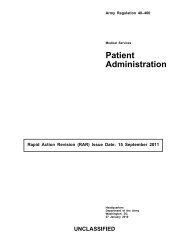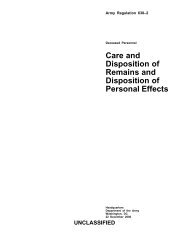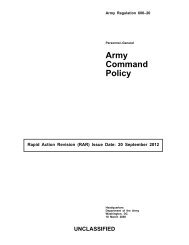Officer Transfers and Discharges - Army Publishing Directorate ...
Officer Transfers and Discharges - Army Publishing Directorate ...
Officer Transfers and Discharges - Army Publishing Directorate ...
Create successful ePaper yourself
Turn your PDF publications into a flip-book with our unique Google optimized e-Paper software.
d. An officer assigned OCONUS on an unaccompanied tour must be able to complete 12 months of the officer’s<br />
tour on or before the effective date of retirement.<br />
e. An officer on an accompanied tour (when dependents travel at Government expense) must be able to complete 12<br />
months of the officer’s tour from the date the dependents arrive in the overseas comm<strong>and</strong>. This ADSO does not<br />
preclude the officer from completing the prescribed tour length in accordance with AR 614–30. The 12–month<br />
overseas restriction does not apply to a RC officer applying for retirement in conjunction with REFRAD under the<br />
provisions of chapter 2 of this regulation.<br />
f. The DCS, G–1, or his designee may defer the voluntary retirement of an officer assigned to a critical position<br />
until a replacement is available through the normal requisitioning cycle. A request for an officer’s deferment must<br />
include the justification (see AR 350–100, paras 1–9b <strong>and</strong> 4–1).<br />
g. The DCS, G-1 or his designee may waive a nonstatutory ADSO for the convenience of the <strong>Army</strong> or when<br />
substantial or undue hardship will result to the officer. The waiver request must be documented with detailed<br />
justification. When the best interest of the <strong>Army</strong> is involved, the following should be considered when processing the<br />
request for retirement:<br />
(1) Retirement in lieu of elimination under chapter 4 or in lieu of other unfavorable personnel action justifying a<br />
waiver of the service obligation.<br />
(2) Retirement of any officer nonselected for promotion to CW3, CW4, CW5, or lieutenant colonel.<br />
6–16. Voluntary retirement in lieu of m<strong>and</strong>atory retirement or in conjunction with the scheduled<br />
release from active duty<br />
a. An RA officer may request voluntary retirement in lieu of m<strong>and</strong>atory retirement under section VI of this chapter.<br />
b. The CG, HRC, will notify the RC officer who is on the ADL <strong>and</strong> scheduled for involuntary REFRAD under<br />
chapter 2 of their retirement eligibility date when it is on or before the RC officer’s m<strong>and</strong>atory release date.<br />
c. A retirement eligible officer who is twice nonselected for promotion to the grade of lieutenant colonel or below<br />
may retire. The officer’s effective date of retirement will not be later than the m<strong>and</strong>atory separation date.<br />
d. An officer who receives a notification memor<strong>and</strong>um of impending elimination may request retirement in lieu of<br />
elimination, if the officer has 19 years <strong>and</strong> 6 months or more AFS on the date of such application. If the officer elects<br />
to retire <strong>and</strong> the elimination action involved misconduct or moral or professional dereliction, CG, HRC, will forward<br />
the retirement application <strong>and</strong> memor<strong>and</strong>um of notification for elimination with all supporting documentation to the<br />
<strong>Army</strong> Grade Determination Board. Any comment or rebuttal by the officer <strong>and</strong> the officer’s OMPF will be included in<br />
the forwarding documentation. The <strong>Army</strong> Grade Determination Review Board will make recommendation as to the<br />
highest grade that the officer has served on AD satisfactorily. The effective date of retirement for an officer—<br />
(1) With 19 years <strong>and</strong> 6 months but less than 20 years AFS will not be later than 60 days after the officer attains 20<br />
years AFS.<br />
(2) With 20 or more years AFS will not be later than 60 days from the date the officer elected retirement in lieu of<br />
elimination.<br />
Section III<br />
Task: Process Retirement in Lieu of Permanent Change of Station<br />
6–17. Rules for processing retirement in lieu of permanent change of station<br />
a. An officer may request retirement in lieu of PCS when he or she has at least 19 years, 6 months AFS <strong>and</strong> a firm<br />
PCS alert is received. The retirement request must be submitted within 30 calendar days of the alert. When an alerted<br />
officer indicates that he or she might exercise the option to retire in lieu of PCS, Career Division may initiate a request,<br />
with recommendation to approval authority CG, HRC to disapprove or delay the retirement based on the needs of the<br />
<strong>Army</strong>.<br />
b. Assignment alert is the official notification of an impending assignment sent by writing, voice, e-mail or other<br />
medium from DA or HRC assignments officials to an officer. An assignment is considered “firm” when an officer has<br />
been selected to fill a valid requisition (that is, when <strong>and</strong> where the officer will be assigned).<br />
c. All service obligations must be met (or waived) before retirement. The PSC/MPD will verify service obligations<br />
by contacting the officer’s career management division before forwarding the retirement request. The waiver request<br />
must be documented with detailed justification. Requests that are not forwarded through channels will be returned.<br />
d. An officer retiring in lieu of PCS will normally remain at the same duty station until retirement unless the needs<br />
of the Service or local circumstances clearly require reassignment (for example, due to deletion of the position,<br />
reorganization, disciplinary problems). If possible, the officer will be reassigned within the same installation if there is<br />
a valid need. When this is not possible, the officer may be reassigned to the closest military installation where there is<br />
a valid need. An officer will not be reassigned exclusively for the purpose of being closer to the requested location of<br />
retirement.<br />
e. The officer may request the retirement to be effective any date not later than 6 months from the date of the PCS<br />
alert or the first day of the month after the officer attains 20 years AFS, whichever is later.<br />
100 AR 600–8–24 12 April 2006/RAR 19 November 2008
















